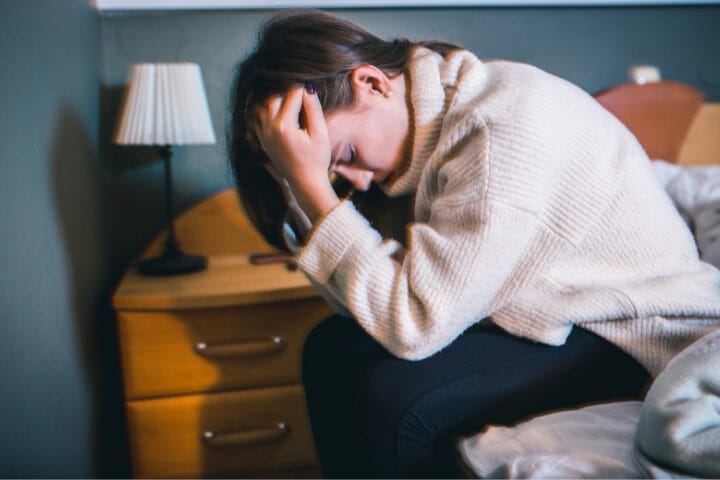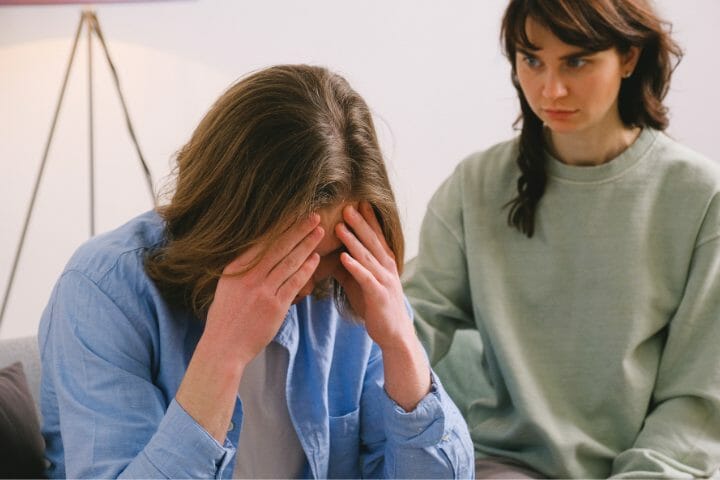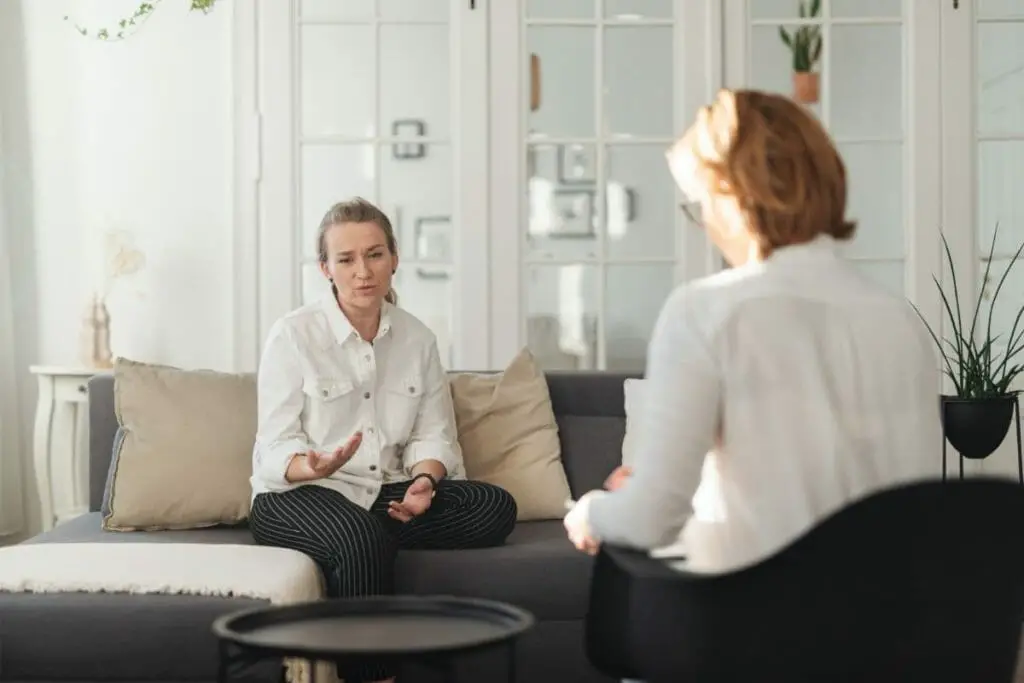Chronic pain and depression can go hand in hand. But it is a silent epidemic that many do not know about. In my journey of managing my mental health with chronic pain, I discovered a lot about myself and the medical system.
This is a personal account of how I am managing depression and chronic pain through some of the best years of my life. Please note – to protect my family’s and my own privacy, I have used stock images in this post to illustrate the points I am making
I am a blogger, a full-time mom to two energetic boys, (I believe) a loving wife, a pet mom, and a community volunteer (among many other roles, these were the top of mind).
I am almost but not quite 40, yet.
About four years ago, three months after the birth of my second child, I started getting bouts of chronic pain. It started as a dull ache in my arms and legs till it spread all over my body and took over all my mind space.
Needless to say, it impacted me – physically, mentally, emotionally and financially.
I had to give up the well-paying job that I loved. I had to severely curtail my activities, I could not be available for my family and I went into depression.
But, I’m not “just” depressed!

As a person who lives with pain, I am well aware that the last thing any of us want to hear is, “You’re depressed.”
In fact, we tend to fear that label and avoid it like the plague, particularly because we translate it to mean – “You’re not really in pain. You’re just depressed.”
In the first year of my pain journey, tears of frustration came quite easily.
Frustration with the system and the difficulty in finding help. Frustration with the constant pain with no relief and not one person to tell me why this was happening or what I could do about it. Frustration with not being believed.
I sometimes wonder how often my pain was dismissed and those tears were recorded as “depression” in my medical record.
The Pit of Depression
Have I been depressed about the situation I find myself in? Certainly! Wouldn’t anyone?
There were times in years past when I felt like I was facing a losing battle and the fear, pain and loneliness had me feeling like I was at the bottom of a deep, dark pit, unable to climb back out.
Human beings are by nature social animals, and I’m no exception.
Before chronic pain started, I led a life full of activity. I was working a full-time job, 40 hours a week. In my spare time, I was volunteering at a community center with programs for seniors.
When I wasn’t working, I spent time with my family going to movies and attending the children’s sports and school activities.

Living a life with pain means giving up so many of the activities we take for granted.
Pain isolates us from our families and friends to the point that they fade into the woodwork and we find ourselves alone much of the time.
I had to give up my full-time job – something that I loved dearly. I have been fortunate to find a passion that pays (maybe not as much as my full-time gig) in blogging, but not everyone is so lucky.
Pain management takes up a good part of my day. I work from home now. I use email to communicate with pretty much everyone concerned with my work.
When the kids go off to school and my husband goes to his job, it is just me and the dog. The silence can be deafening, and I have to use all of the tools in my tool belt to keep from falling back into the pit.
I’ve learned that what I experienced is referred to as situational depression. It was during those times that I turned to my online peer support group.
Those people living with pain 24/7 who really understood. They helped pull me back out of “the pit” and helped me to see all of the good things around me that I was missing by focusing on what I had lost.
Chronic pain isn’t just about physical pain. Chronic illnesses devastate finances and families and often result in job loss, divorce, bankruptcy and more.
It’s no wonder that depression plays a part for so many. It’s normal!
Pain, Depression and Stigma
Those who live with chronic pain also live with the stigma that comes with wearing the label of a pain patient. We’re called malingerers, drug seekers, lazy and more.
Since depression is a mental health issue, it carries a stigma as well. The National Institute of Mental Health (NIMH) website lists four things that everyone should know about depression:
- Depression is a real illness.
- Depression affects people in different ways.
- Depression is treatable.
- If you have depression, you are not alone.
The same could be said for chronic pain:
- Chronic pain is a real illness.
- Chronic pain affects people in different ways.
- Chronic pain is treatable.
- If you have chronic pain, you are not alone.
So then, why was I afraid to ask for help with depression?
I lost my job, my independence, my transportation, my ability to walk unassisted, my ability to do simple things like tie my shoes and fold a load of laundry and so much more. It would only be “normal” to need some help in dealing with all of that.
Getting Help
Thankfully, my former employer paid for a year of counseling for me. I learned some things over that year.
There was no shame in going to a professional for some help in working through all of these changes in my life – and – it helped. Going through some therapy gave me the tools that I need to stay out of the pit.

A peer support group is a crucial part of my chronic pain toolkit and, after almost four years of living with pain, it remains one of the key things that help me live this new chapter in my life. However – it cannot be a substitute for professional help when needed.
We don’t try to make major repairs on our car without a mechanic. We call the plumber when the basement is flooded. And we all know the quote from Abraham Lincoln, “He who represents himself has a fool for a client.”
We struggle so much just to be believed about our pain that we can be truly terrified to admit that perhaps we need help with depression as well.
Perhaps we are suffering from major or clinical depression and need ongoing treatment. None of this negates our pain. In fact, depression and pain can feed off of each other, making both challenges worse.
If you find yourself “in the pit” of depression, don’t try to fix it on your own. Seek help.
How to get help?
If you are in crisis and need immediate emotional support, you will find that it is more readily available than you thought. Reach out and ask for it.
Here are a few avenues that you can seek to get professional and emotional support for mental health issues:
- Call your or your loved one’s health professional.
- Call 911 for emergency services.
- Go to the nearest hospital emergency room.
- 1-800-273-TALK (1-800-273-8255) National Suicide Prevention Hotline
- 1-800-442-HOPE (1-800-442-4673) Kristin Brooks Hope Center National Hotline
- 1-877-Vet2Vet (1-877-838-2838) Veterans peer support line or chat online
- 1-800-SUICIDA (1-800-784-2432) Spanish speaking suicide hotline
- IMALIVE.org (volunteers are trained and certified in crisis intervention)
If you think you or a loved one might be depressed, read up about the signs of depression and where to turn for help.
Suicide and Chronic Pain
I began writing this blog last year thinking that December would be an important time to address depression and suicide as it relates to chronic pain.
As a lay person, I’ve read about seasonal affective disorder (SAD), a type of depression linked to the seasons, and I assumed that depression and suicide would be more prevalent during this time of year.
I’ve learned recently that suicides are actually more prevalent in the spring. Of course, one life lost is too many and this topic is valid regardless of the season.

Thankfully, I have never experienced suicidal thoughts and feelings.
I was fortunate to have discovered the importance of having hope very early in my pain journey and I credit my peer support group for helping me hold on to it.
While they were all older than me by at least a decade, if not more, when I joined them, I felt their energy levels were quite the same as what I had before my chronic pain started.
They were positive, upbeat, laughing and joking together – and sharing tips on gardening and other hobbies they were participating in.
I was dumbfounded. How were they able to laugh? How could people with severe back pain do gardening? I had to learn how they were doing it.
Four years later, I still have a brown thumb, but I laugh, I joke and I have a life that is not held hostage by pain.
Peer support, professional counseling and lots of teaching from numerous organizations dedicated to helping people living with pain have given me hope and purpose. Without that support, things could have been quite different.
Many people living with pain have lost all hope and feel completely alone as if no one else could understand.
Despite the estimated 116 million people who live with chronic pain in the US, so many have no idea that there are others going through the same thing. I want them to know that they are not alone.
There are people who do understand and who are advocating for better pain care. And there is hope.
The most important thing for anyone who is having these thoughts and feelings is to reach out for help.
